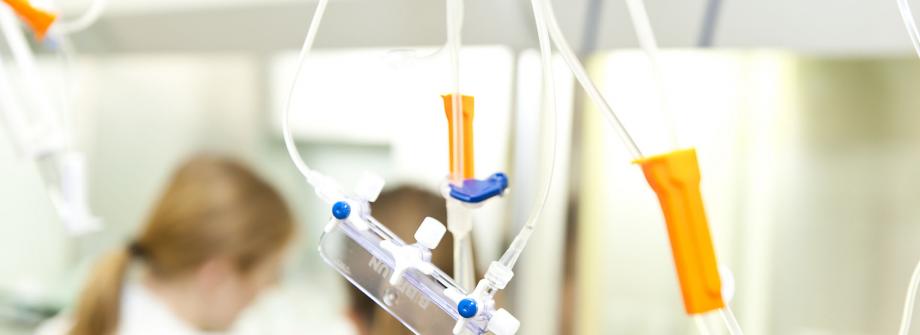
March 2021 Clinical Case of the Month
Title: Relapsed diffuse large B cell lymphoma (DLBCL)
Submitted by: Syed Ali Abutalib and Nicolaus Kröger
Physicians expert perspective: Didier Blaise and Luca Castagna
38-year-old male with known relapsed diffuse large B cell lymphoma (DLBCL) comes for a second opinion. He was diagnosed with stage IIIB, activated B cell (ABC)-DLBCL with high IPI (score of 3) almost 12 months ago. The c-MYC, BCL-2 and BCL-6 were negative on gene rearrangement and immunohistochemistry testing. Unfortunately, he relapsed, confirmed with a repeat lymph node biopsy, after progression-free survival of just 10 months following achievement of complete remission (CR1) with 6 cycles of R-CHOP (rituximab plus cyclophosphamide, doxorubicin, vincristine, and prednisone). The repeat CSF screen was negative for CNS disease. Currently, he has achieved partial remission (PR2) after two cycle of R-ICE (rituximab, ifosfamide, carboplatin, etoposide) salvage regimen. Patient has an excellent (90%) Karnofsky performance status and does not have any co-morbid conditions. He has an HLA-matched younger brother.
Which of the following is the next best management plan?
A. Continue R-ICE for two more cycles and repeat the positron emission tomography scan
B. Proceed with autologous hematopoietic cell transplantation
C. Plan for tandem transplantation - autologous hematopoietic cell transplantation followed by allogeneic hematopoietic cell transplantation
D. Plan for anti-CD19 directed CAR-T cell therapy
Expert Perspective by Professors Blaise and Castagna
This patient is affected by poor prognosis DLBCL because after achieving complete remission, he had early (<12 months) relapse. Salvage chemotherapy was effective with metabolic partial remission and demonstrated chemosensitivity, a prerequisite for subsequent high-dose chemotherapy and autologous hematopoietic cell transplantation (auto-HCT)
In the CORAL study, such patients (early relapse, Rituximab in the first-line) showed a 2-year PFS of 39% when proceed to high-dose chemotherapy and auto-HCT 1 . In this large randomized study, PFS was not different for those achieving PR compared to CR. However, one could argue to improve on first line salvage regimen for better responses but that is not an option provided in this particular question.
Recently, Shah et al. on behalf of CIBMTR analyzed patients with or without early relapse after first salvage chemotherapy regimen. In patient who achieved PR after salvage chemotherapy the 5-year PFS was 40% with early relapse compared to 41% in patients without early relapse. Furthermore, no difference in terms of relapse rate or non-relapse mortality was reported 2 .
On the ground of these results the present standard strategy is to proceed with auto-HCT (Choice B). Choice A will not add further clinical benefit but toxicity in this particular case.
However, results are obviously not optimal with this option. In this perspective participation to clinical trial evaluating the place of early cellular immunotherapy such as choices C3 or D are reasonable considerations and must be investigated.
Correct Answer – B
References
1. Gisselbrecht C, Glass B, Mounier N, Singh Gill D, Linch DC, Trneny M et al. Salvage regimens with autologous transplantation for relapsed large B-cell lymphoma in the rituximab era. J Clin Oncol 2010; 28(27): 4184-4190. e-pub ahead of print 2010/07/28; doi: 10.1200/JCO.2010.28.1618
2. Shah NN, Ahn KW, Litovich CA, He Y, Sauter CS, Fenske TS et al. Is Autologous Transplant in Relapsed DLBCL Patients Achieving Only a PET+ PR Appropriate in the CAR-T cell Era? Blood 2020. e-pub ahead of print 2020/10/30; doi: 10.1182/blood.2020007939
3. Crocchiolo R, Castagna L, Furst S, El-Cheikh J, Faucher C, Oudin C et al. Tandem autologous-allo-SCT is feasible in patients with high-risk relapsed non-Hodgkin's lymphoma. Bone Marrow Transplant 2013; 48(2): 249-252. e-pub ahead of print 2012/06/27; doi: 10.1038/bmt.2012.116bmt2012116 [pii
Contacts
Syed Ali Abutalib, MD
Associate Director, Hematology and Cellular Therapy Program
Director, Clinical Apheresis Program
Cancer Treatment Centers of America, Zion, Illinois
Associate Professor, Rosalind Franklin University of Medicine and Science
Email: abutalib110@gmail.com
Nicolaus Kröger, MD
Professor and Medical Director of the Department of Stem Cell
Transplantation at the University Hospital Hamburg-Eppendorf, Germany
University Hospital Hamburg, Hamburg, Germany
Correspondence: Nicolaus Kröger, MD
Email: nkroeger@uke.uni-hamburg.de
Expert Perspective
Prof. Didier Blaise, MD
Hematology department, Director
Transplant and Cellular Immunotherapy program, Director
Centre de Recherche en Cancerologie de Marseille, INSERM (UMR 1068), CNRS (UMR 7258)
Aix- Marseille University (AMU)
Institut Paoli-Calmettes
Marseille, France
Dr Luca Castagna, MD
Humanitas Clinical and Research Center
IRCCS
Via Manzoni 56
20089 Rozzano
Milan, Italy
Future Clinical Case of the Month
If you have a suggestion for future clinical case to feature, please contact Nicolaus Kröger.